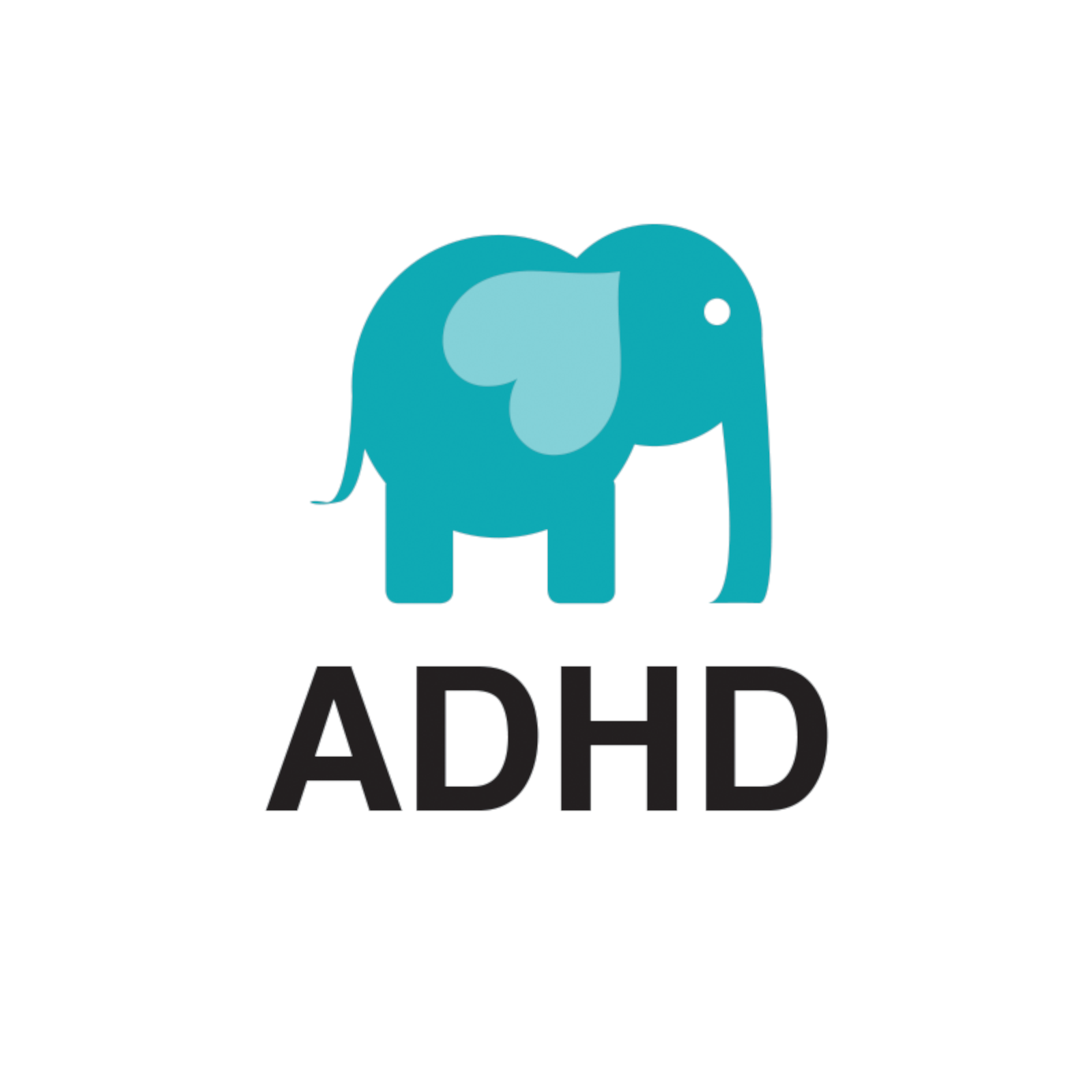
809.3K
Downloads
213
Episodes
Drawing on years of experience working with families, Parenting Coaches Siope Kinikini and Kimber Petersen share how families can improve, heal, and find success using the proven methods of the Teaching-Family Model. Visit smarterparenting.com to learn more.
Episodes
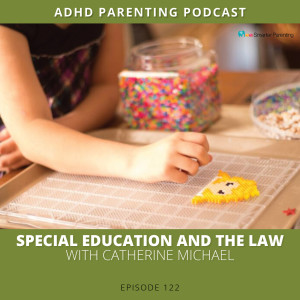
Wednesday Feb 10, 2021
Ep #122: Special education and the law with Catherine Michael
Wednesday Feb 10, 2021
Wednesday Feb 10, 2021
It can be frustrating and disheartening at times to find resources, and even information about resources within school systems. There is hope!
Today, ADHD Parenting Coach, Siope Kinikini, speaks with attorney Catherine Michael to learn about the laws and options available to provide the appropriate resources and accommodations your child needs to succeed in school.
Sometimes schools and educators don’t know what resources are available or what they are legally required to provide for your child.
It is never too late to help your child get the resources they need. Help and hope are there for you and your child.
Catherine Michael’s Kindle book “The Exceptional Parent's Guide to Special Education Law and Advocacy” is available at Amazon.com.
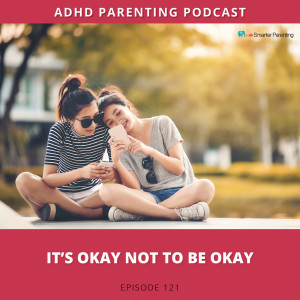
Wednesday Feb 03, 2021
Ep #121: It's okay not to be okay
Wednesday Feb 03, 2021
Wednesday Feb 03, 2021
As parents, we may feel that we need to be the ones that hold it together for our families. That we need to operate at inhuman levels all the time and that we're not allowed to feel less than that.
If this pandemic has taught us anything, it's been that it's okay not to be okay all the time. As a parent, you are allowed to have emotions and to feel them. You are allowed to need breaks or have an off day.
These things do not make you a terrible parent. They make you a real one. They make you a relatable one.
Sometimes, by keeping it all together all the time, we are sending the wrong message to our children. We may see it as being strong, but our children may learn that it's not okay for them to struggle and have off days. Or that it's not okay to discuss difficult topics.
Which is not what we want them to learn. We want to help our children learn how to manage their emotions and fears in healthy and productive ways instead of sweeping them into a corner or covering them up.
When parents can be real and vulnerable and articulate their fears and concerns, it is very liberating for kids. They feel they have a safe space to discuss their thoughts and feelings, especially when parents can use Effective Communication.
We're going to get through this. You're doing a fantastic job dealing with everything that's happening. And it's okay to take those breaks and eat the chocolate!
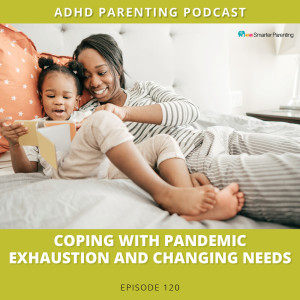
Wednesday Jan 27, 2021
Ep #120: Coping with pandemic exhaustion and changing needs
Wednesday Jan 27, 2021
Wednesday Jan 27, 2021
As this pandemic wears on, we feel the exhaustion of constant changes and frustration that things aren't back to normal.
How we need to parent has changed. Finding success now means being able to adapt and change our expectations.
If you are still insisting on parenting how you did pre-pandemic, you are only setting yourself up for failure. Even when the pandemic is over, things won't go back 100% to what they were before.
There is both a technical and an artistic side to parenting. The Teaching-Family Model skills are effective, both pre-pandemic and pandemic, because they address both the technical and artistic side of parenting. The technical side is the actual steps of the skills, which never change. That consistency is essential in helping your child feel safe amid change. The artistic side of the skills is how you implement them to address your child's individualized needs. The flexibility allows your child to feel seen.
This combination is powerful in helping you adjust as the needs of your children change, which creates a stronger bond with your child.
You can do this! We have such faith in you. We know you want to be the best parent possible because you're listening to this podcast and making needed adjustments.
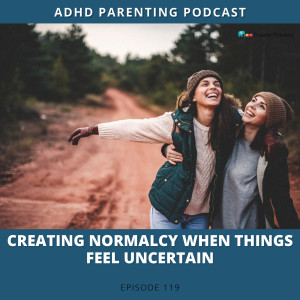
Wednesday Jan 20, 2021
Ep #119: Creating normalcy when things feel uncertain
Wednesday Jan 20, 2021
Wednesday Jan 20, 2021
When things get upended, we want to find a sense of normalcy for ourselves and our kids. This need for normalcy has been especially needed over the last year as parents have dealt with a global pandemic, economic hardship, school closures, and racial and political tensions.
When dealing with all of these events, is it even possible to offer normalcy? Yes.
You will not be able to offer normalcy in everything--it just isn’t possible. You can find specific things to provide normalcy, such as morning or bedtime routines, exercise routines, chores, family schedules, family outings, etc.
For example, you may be doing school online, but you can still practice your in school morning routine by having them get ready for the day and having them leave the house and then come back in as it signals to your child, “Hey, nothing has changed even though how we do school has changed.”
Having a sense of normalcy is essential for kids who struggle with changes in routines and feel anxious or out of control when those routines change.
Adhering to routines allow your children to feel safe, secure, and in control even when situations change. Routines also give your child permission to understand what is happening around them, but in a way that feels safe and comfortable.
Routine and structure are important, but especially when things are unpredictable.
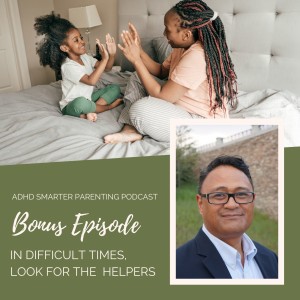
Friday Jan 15, 2021
Bonus episode: In difficult times, seek out the helpers
Friday Jan 15, 2021
Friday Jan 15, 2021
Hi, friends. Checking-in as we know that the world feels very chaotic right now and it can be hard to know how to best handle the chaos.
This is a bonus episode of the ADHD Smarter Parenting podcast. We felt like it was important to reach out to you and to help you navigate everything that's happening in the world today. Along with the pandemic and all of the other things that have been happening around the world, this is a trying time for parents and especially for children. I wanted to give you some tips and suggestions on things for you to consider as you navigate this difficult time.
There's specifically three things I want you to be aware of. Number one, be aware that you are the filter for your children. The way things are transpiring and the way that things are happening, they are seeing the world not only for themselves, but also through the filter that you give them. So be careful and be aware of the way that you present the information, the way that you share the information, and the way that you react to the information that you are seeing. It's important for you to understand that you are giving your child permission to behave in the same way. Be aware.
Now, the second thing is, if your child is struggling and you are struggling, the best thing you can do is to listen. Take some time to ask some questions and just listen. If you know the skill of Effective Communication from Smarter Parenting, you realize that step number four is where you actually start sharing your perspective on things. There are three steps before that that require you to focus and to listen. So if you get stuck, ask questions, listen, probe, find out more, understand a little bit more about what's going on.
Now, the last thing I want you to keep in mind is something that was shared with me that I thought was fantastic. It's the advice given by Mister Rogers. I don't know if you're familiar with Mister Rogers back in the 1960s and '70s. He was a pioneer in children's programming and helped children learn about difficult topics through his show on PBS, the Public Broadcasting Service.
He says that whenever there are difficult times, it's important for you to help your children look for the helpers. Now, I want you to think about that. Looking for the helpers, who are the helpers around us? Who are the people that are reaching out and helping other people? You can help your children navigate this difficult time by helping them recognize the helpers that are out there.
Let me give you a brief example. When I'm watching the news or I am listening to the radio and there's so much going on, I don't find a lot of reporting on the helpers that out there, or really an in-depth look at the helpers. There's a lot of ranting, and raving, and screaming, and tantrum behaviors that is happening on the news. But, I was able to recognize that within my own community, as I went to the store, as I would visit the office or a different place, or even go somewhere for supplies, that there are people out there who are the helpers.
I went into a grocery store and surprisingly, the cashier was very positive and very helpful, asking if I had found everything, asking if I had a good day. Just really there, present in the moment. That's somebody who's a helper, that's somebody who is looking out and making a connection with somebody on a daily basis. You can find the helpers. They're around you, you just have to pay attention, and sometimes you have to learn how to tune out the noise from other people who are just louder than they are and you'll find helpers all over the place. These can include essential workers. I did go in to get a shot in a medical clinic, and even there, the person giving me the shot, the nurse was extremely kind. Very, very kind and thoughtful. She's a helper. The cashier at the store was a helper. I had a neighbor drop off some treats just because, that neighbor's helper. There are helpers.
And if we focus and help our children focus on recognizing who these helpers are, it really does make a difference in getting them to understand our time and giving nuance in context, that even though we struggle and there are really a lot of things happening in the world, that there still is good out there if we look and if we find it. It's the same principle with your own kids. When we look for the good, we will find the good. So consistently look for the good and Effectively Praise them.
I'm offering these as suggestions for you during this tumultuous time that we are living in. Not only during the pandemic and school shut downs and so much more, these are things that I really wanted parents to keep in mind. I will talk to you again on the podcast later. That's it from me, have a good day. Bye.
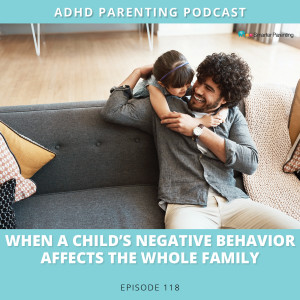
Wednesday Jan 13, 2021
Ep #118: When a child's negative behavior affects the whole family
Wednesday Jan 13, 2021
Wednesday Jan 13, 2021
When one child requires more attention, it can throw the family dynamic off or cause other children to adopt the negative behaviors to get increased attention. As a parent, it can be hard to navigate how to deal with all the family's needs in a way that works for everyone. When things aren't balanced, often parents feel a lot of guilt and stress, and in trying to make things fair or right with their other children, they may actually be inadvertently adding to the imbalance.
Our children have different personalities and different needs. As a parent, we want things to be equal for our children. We think we are equal by spending equal amounts of time, giving equal attention, or dealing with them in the same way. Fair doesn't mean equal. In fact, for some children, too much time actually could make them feel anxious or nervous. What is important is that how we interact with them fulfills their needs.
Convey this idea to our children that fair doesn't mean equal is essential. Once children understand this, often attention-seeking behaviors will decrease.
When a child requires a lot of attention, it's helpful for parents to reframe that negative behavior. Finding the positive from that behavior allows you to help them turn that into strengths instead of using it negatively. For example, suppose a child is upset. In that case, you can reframe that as they can advocate for themselves, which allows you to find opportunities where they can positively advocate for themselves.
These two things will go a long way in changing the dynamic in your family for the better.
Don't forget to join the Smarter Parenting Club. Get access to exclusive materials, and at the gold and platinum levels, coaching.

Wednesday Jan 06, 2021
Ep #117: I am not the parent I thought I would be
Wednesday Jan 06, 2021
Wednesday Jan 06, 2021
If you're struggling feeling like you're failing as a parent, this podcast will give you hope!
What parent hasn't thought, "I didn't think I'd be like this as a parent"? Because raising kids isn't always easy as kids push our buttons and test boundaries, and, sometimes, we don't always respond how we wish we would.
You don't have to live with guilt or regret. Becoming the parent you want to be is possible. Yes, really! Change is possible, and you can set your family and your relationships on a new course by learning the behavior skills we teach on SmarterParenting.com.
When parents have a toolbox full of behavior tools, they can feel confident knowing they can handle any situation in the best way possible. The same goes for your kids. When they learn behavior skills, they understand they have options for how they respond, allowing them to make better choices.
We want you to succeed. We want to help you become the parent you want to be. You can do it!
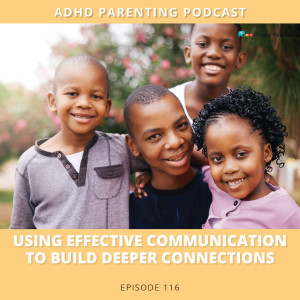
Wednesday Dec 30, 2020
Ep #116: Using Effective Communication to build deeper connections
Wednesday Dec 30, 2020
Wednesday Dec 30, 2020
Smarter Parenting continues the story about how Effective Communication helps survivors of human trafficking in Africa and allows them to begin the healing process; and how the same outcome is possible for kids with ADHD, Autism, Anxiety, etc.
Children who have experienced trauma have difficulty trusting adults and discussing that trauma. Effective Communication provides a safe space for them to feel comfortable talking about what they have experienced.
Effective Communication is a powerful tool because it can deepen relationships, no matter what a child is experiencing. Effective Communication allows a child to feel heard and understood, which in turn enables them to open up and discuss difficult topics.
Families that have open lines of communication are able to discuss difficult subjects and situations in constructive ways that lead to solutions instead of arguments and judgment.
The Teaching-Family Model allows parents to tailor their interactions with their children to find success. It is used by agencies and families worldwide because the Model is culturally and individually sensitive.
Don't forget to check out the skill of Effective Communication on SmarterParenting.com.
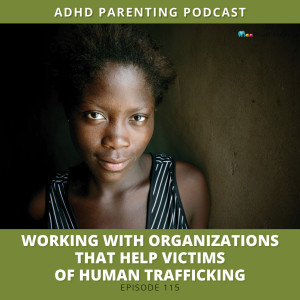
Wednesday Dec 23, 2020
Ep #115: Working with organizations that help victims of human trafficking
Wednesday Dec 23, 2020
Wednesday Dec 23, 2020
Today's episode covers a challenging topic, human trafficking, as we share how we've taught the Teaching-Family Model skills to help aftercare organizations in Africa help survivors.
An estimated 2.5 million children and adults worldwide are victims of human trafficking each year. A staggering number that many organizations are looking to reduce. Those rescued often go through an aftercare program that allows them to learn how to heal, how to prevent it from happening again, and learn skills that will enable employment.
We have worked with various organizations to help the survivors through recovery by providing resources and teaching them the skills of the Teaching-Family Model. Our mission at Smarter Parenting is to heal and elevate families around the world. One of the reasons various agencies have approached us is that the Teaching-Family Model is proven to work with kids who have experienced trauma and is culturally sensitive. Because we have chosen to fulfill our mission mainly via the internet, this has allowed organizations worldwide access to materials that aid in successfully implementing these skills.
For more information about our work in Africa, please visit our website.
We are passionate about sharing the Teaching-Family Model skills because we know it helps families worldwide. If you haven't yet visited SmarterParenting.com to learn the skills, we invite you to do so.
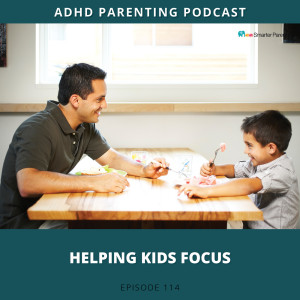
Wednesday Dec 16, 2020
Ep #114: Helping kids focus and stay on task
Wednesday Dec 16, 2020
Wednesday Dec 16, 2020
In this episode, Parenting Coach Siope Kinikini answers parents' questions about anxiety and helping kids focus, especially when it comes to remote learning.
While kids are amazing and adaptable, remote learning has been a challenge for many as it has required them to learn new skills and take a different role in their education. This shift has been more comfortable for some kids, while others have struggled with online learning as the pandemic has increased their anxiety.
If your child struggles with staying focused during remote learning, you may wonder what you can do? The good news is that you can make some small changes to help your child better pay attention. These strategies include:
- Reducing distractions.
- Getting out excess energy before they start.
- Allowing them breaks.
- Making doable to-do lists that help them stay on task and understand what they need to do.
It would be best if you tailored strategies to your child's needs and personality. It may take some time to figure out exactly what will best help your child pay attention.
When teaching your child focusing strategies, we recommend that you use the skill of Preventive Teaching and Role-playing. Using these two skills better helps your child understand what they need to do and gives them experience using these strategies. The more you can Role-play behavior and expectations, the easier it will be for your child to do it when they need to.
If your child becomes distracted during online learning, use the skill of Correcting Behaviors to help them refocus and get back on track. Correcting your child’s behavior can be tricky for a lot of parents. You can find free resources on Smarter Parenting that will help.
If you want help individualizing focusing strategies for your child, sign up for the Smarter Parenting Club.
